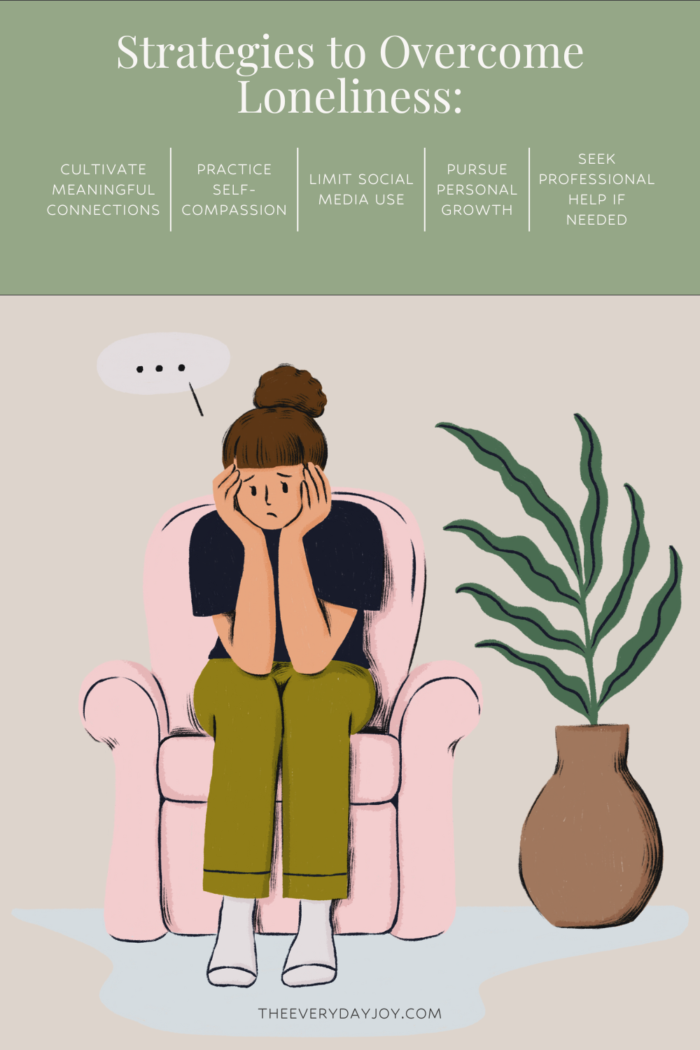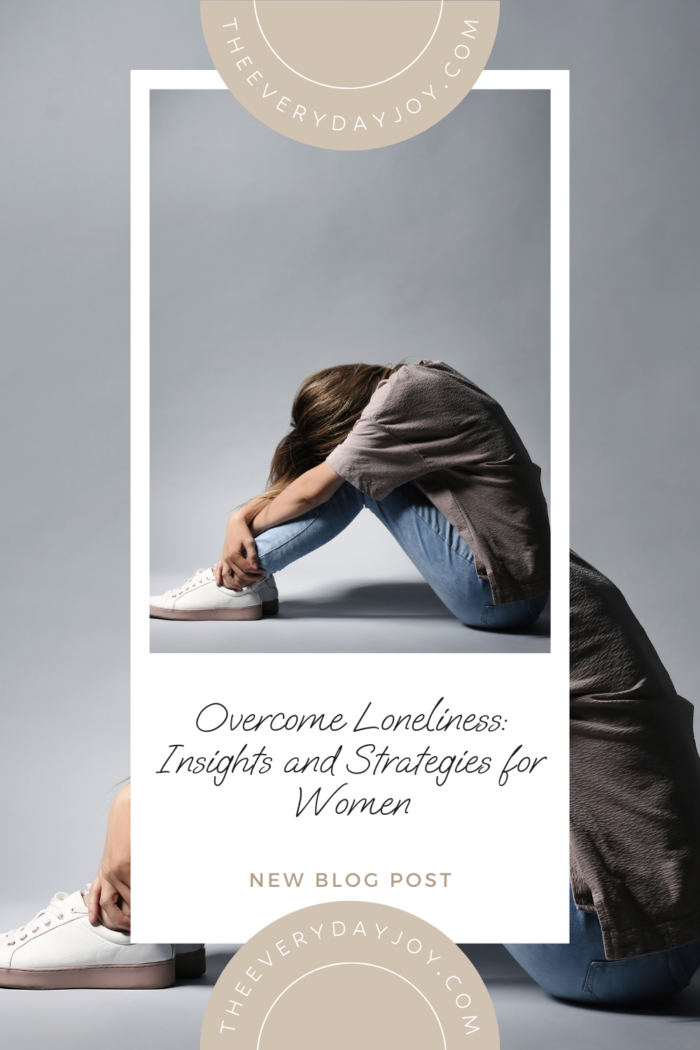Overcome Loneliness: Insights and Strategies for Women

Embarking on the journey through loneliness can feel like navigating a complex maze, especially for women between 20 and 40. This period of life is filled with significant transitions, from building new relationships to establishing careers and grappling with the complexities of adulthood. In this blog post, we’ll dive into the statistics surrounding loneliness, tease apart the differences between loneliness and isolation, explore how loneliness impacts mental and physical health, and provide practical strategies to overcome loneliness in this age group.
Understanding Loneliness:
Loneliness isn’t just about being physically alone; it’s a deep emotional state characterized by a sense of emptiness, disconnection, and a longing for meaningful connections. Studies show that young adults, especially women, are more prone to feeling lonely than older generations. Social pressures, relationship dynamics, career stresses, and the omnipresence of social media all contribute to this sense of isolation.
Loneliness can feel like a cloud that follows you everywhere, even in the midst of crowded places. It brings forth a rollercoaster of emotions, from sadness and despair to anxiety and frustration. These feelings ebb and flow but persistently color how we see ourselves and the world around us. Feeling like we don’t quite fit in, we might doubt ourselves and struggle with a sense of alienation.
One of the most heart-wrenching aspects of loneliness is the yearning for connection – the deep desire to be truly seen, heard, and valued by others.
Impact of Loneliness:
The effects of loneliness stretch far beyond mere feelings. Mentally, it’s closely tied to depression, anxiety, and low self-esteem, especially among young women. Physically, chronic loneliness can up the risk of heart disease, weaken the immune system, and even lead to earlier mortality. And socially, it makes forming and maintaining relationships challenging, feeding into a vicious cycle of isolation.
Statistics on Loneliness:
According to a survey by Cigna, young adults, particularly Generation Z and millennials, top the loneliness charts. A whopping 79% of Gen Z and 71% of millennials report feeling lonely. Moreover, women are more likely than men to battle chronic loneliness, with 22% feeling lonely most of the time, compared to 16% of men.
Distinguishing Loneliness from Isolation:
Loneliness isn’t just about being physically distant; it’s an emotional state. While isolation is being physically separated from others, loneliness is more about feeling disconnected, even when surrounded by people. It’s the difference between merely existing in a room and feeling truly connected to those around you. Recognizing this difference underscores the importance of fostering quality relationships over sheer quantity.
Strategies to Overcome Loneliness:
Cultivate Meaningful Connections:
Make a conscious effort to nurture genuine relationships with friends, family, and colleagues.
Focus on quality over quantity, seeking out connections that fulfill emotional needs and provide a sense of belonging.
Engage in activities that encourage bonding, like sharing hobbies or engaging in meaningful conversations.
Practice Self-Compassion:
Be kind to yourself; remember, loneliness is a shared human experience.
Take care of your emotional well-being through practices like meditation and spending time in nature.
Limit Social Media Use:
Be mindful of how much time you spend on social media, and set boundaries to protect your mental health.
Prioritize face-to-face interactions and meaningful offline connections.
Pursue Personal Growth:
Invest in activities that bring you joy and fulfillment, whether it’s exploring new hobbies or volunteering.
Consider furthering your education to expand your social circle and broaden your horizons.

Seek Professional Help if Needed:
Don’t hesitate to reach out to a mental health professional if loneliness persists despite your efforts.
Therapy provides a safe space to explore underlying emotions and develop coping strategies.
Finding Comfort in Faith:
When loneliness weighs heavy on our hearts, turning to faith can feel like finding a warm embrace in a cold world. It’s like having a trusted friend who listens without judgment and offers unwavering support. Verses from the Bible, like Psalm 23:4, Isaiah 41:10, Matthew 28:20b, Hebrews 13:5b, and Romans 8:38-39, are like gentle reminders of God’s constant presence and boundless love, especially when we feel most alone.
“Even when I walk through the darkest valley, I will not be afraid, for you are close beside me. Your rod and your staff protect and comfort me.”
– Psalm 23:4 (NLT)
Psalm 23:4 vividly portrays God as a caring shepherd, walking alongside us through life’s darkest valleys. The imagery of traversing these challenging terrains while feeling God’s protective presence offers immense comfort and reassurance. It’s like having a trusted guide who leads us through the toughest times, never leaving our side.
“Don’t be afraid, for I am with you. Don’t be discouraged, for I am your God. I will strengthen you and help you. I will hold you up with my victorious right hand.”
– Isaiah 41:10 (NLT)
Isaiah 41:10 echoes this sentiment, offering words of encouragement to those grappling with fear and uncertainty. It’s like a comforting hand on our shoulder, assuring us that we need not be afraid because God is with us. His promise to strengthen, help, and uphold us is like a beacon of hope, guiding us through the storms of loneliness.
“And be sure of this: I am with you always, even to the end of the age.”
– Matthew 28:20b (NLT)
Matthew 28:20b assures us of Jesus’ perpetual presence, extending not just to His disciples but to all believers across time. It’s like a reassuring hug from a dear friend, reminding us that we are never truly alone, even in our darkest moments. Regardless of life’s challenges, Jesus promises to be with us, offering guidance, support, and companionship every step of the way.
“Do not be afraid or discouraged, for the LORD will personally go ahead of you. He will be with you; he will neither fail you nor abandon you.”
– Deuteronomy 31:8 (NLT)
Deuteronomy 31:8 reinforces this promise of God’s unwavering presence and faithfulness. It’s like a love letter from our Heavenly Father, assuring us that He will never leave or forsake us, no matter what. This unbreakable bond between God and His children offers a sense of security and peace in the midst of loneliness and uncertainty.
“And I am convinced that nothing can ever separate us from God’s love. Neither death nor life, neither angels nor demons, neither our fears for today nor our worries about tomorrow—not even the powers of hell can separate us from God’s love. No power in the sky above or the earth below—indeed, nothing in all creation will ever be able to separate us from the love of God that is revealed in Christ Jesus our Lord.”
– Romans 8:38-39 (NLT)

Romans 8:38-39 serves as a powerful declaration of God’s enduring love and sovereignty. It’s like a soothing balm for the soul, reminding us that nothing in all creation can separate us from God’s love. In moments of despair and isolation, this truth becomes our anchor, holding us steady amidst life’s turbulent seas.
In addition to finding solace in Scripture, fellowship with fellow believers can provide a lifeline of support and encouragement. Joining a faith community, attending church services, or participating in small group gatherings offer opportunities for connection, mutual support, and spiritual growth. Through shared worship, prayer, and fellowship, believers can find comfort in knowing that they are part of a more prominent family of faith united by their shared love for God and one another.
Conclusion:
Loneliness is a common experience for women, but it doesn’t have to define your life. By understanding the factors contributing to loneliness, distinguishing it from isolation, and implementing practical strategies to cultivate meaningful connections, you can overcome feelings of loneliness and foster a sense of belonging and fulfillment in your life. Remember, you are not alone in your journey, and reaching out for support is a sign of strength, not weakness.

- Reflect on a time when you felt lonely despite being surrounded by people. What emotions did you experience during that time, and how did it affect your perception of yourself and the world around you?
- According to the statistics mentioned, young adults, particularly women, are more prone to loneliness. Why do you think this is the case? How can understanding these statistics help us address loneliness more effectively?
- Explore the difference between loneliness and isolation described in the blog. Can you recall a time when you felt lonely but not necessarily isolated? How does recognizing this difference influence your approach to building meaningful connections?
- Consider the practical strategies provided for overcoming loneliness, such as cultivating meaningful connections, practicing self-compassion, limiting social media use, pursuing personal growth, and seeking professional help if needed. Which of these strategies resonate with you, and how do you plan to implement them in your life?
Disclaimer: This article does not provide medical advice.
The information, including but not limited to, text, graphics, images and other material contained on this article are for informational purposes only. No material on this site is intended to be a substitute for professional medical advice, diagnosis or treatment. Please contact you medical professional or counselor for further information.




